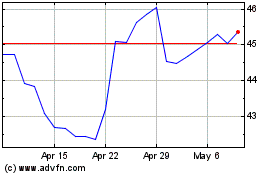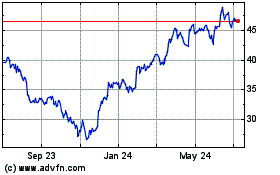Stocks Soar on Trade Concessions -- WSJ
July 26 2018 - 3:02AM
Dow Jones News
By Danielle Chemtob and Ben St. Clair
This article is being republished as part of our daily
reproduction of WSJ.com articles that also appeared in the U.S.
print edition of The Wall Street Journal (July 26, 2018).
U.S. stocks surged in the final half-hour of trading Wednesday
after President Trump secured some concessions from the European
Union to avoid an escalation in trade tensions.
President Trump declared a "new phase" in the relationship
between the U.S. and the European Union after the two parties
agreed to lower industrial tariffs and increase liquefied natural
gas and soybean exports to Europe. Mr. Trump also said the U.S. and
the EU would "resolve" the steel and aluminum tariffs imposed
earlier this year. He added they agreed to hold off on proposed
auto tariffs, offering some relief for shares of car makers, which
had recently been under pressure.
The Dow Jones Industrial Average climbed 172.16 points, or 0.7%,
to 25414.10, after earlier declining as much as 128 points. The
S&P 500 added 25.67 points, or 0.9%, to 2846.07. The
technology-heavy Nasdaq Composite rose 91.47 points, or 1.2%, to
7932.24, closing at another record.
But some investors are taking the trade deal with a grain of
salt. "There's a lot of possibility here, but it's not concrete
yet," said Jamie Cox, managing partner for the Harris Financial
Group.
Shares of industrial companies in the S&P 500 rallied 1.2%
following the announcement. Boeing shares recovered some of their
losses, despite results reported earlier in the day that weren't as
strong as some analysts and investors expected. The aerospace
giant's shares fell $2.35, or 0.7%, to $355.92.
The potential for a reprieve on trade tensions added to momentum
from what is shaping up to be a strong corporate-earnings season.
About 28% of companies in the S&P 500 have reported results for
the latest quarter, and earnings are up 21% on average for those
companies.
Shares of General Motors declined 1.83, or 4.6%, to 37.65 after
the company lowered its 2018 profit outlook based partly on
unexpectedly high raw-materials costs in the wake of U.S. tariffs
on steel and aluminum.
"I think what a lot of people are focused on today is the
question mark of, have we seen peak earnings power because the
first half of 2018 has been so strong?" said Martin Jarzebowski,
vice president and portfolio manager with Federated Investors.
The technology sector rose 1.5% in anticipation of Facebook's
latest results. After the closing bell, the social-media giant
reported slower-than-expected revenue growth in the second quarter,
indicating it felt some effects from a series of controversies over
the past several months. Its shares slumped 21% in after-hours
trading and pulled down other social-media stocks, including
Twitter and Snap.
Many investors are still worried that regulation is a looming
threat for technology companies.
"When profit margins are this high, the temptation for
politicians one way or the other to skim a little bit off the top
is going to grow," said David Kelly, chief global strategist at
J.P. Morgan Asset Management.
The strengthening dollar is another growing headwind for
technology companies, which derive a significant percentage of
their revenue abroad. The WSJ Dollar Index, which measures the U.S.
currency against a basket of 16 others, slipped 0.4% but is up 2.3%
for the year.
"A stronger dollar is not a beneficial dynamic for a lot of
companies," said Mr. Jarzebowski of Federated Investors.
Coca-Cola posted stronger-than-expected revenue growth, pushing
its shares up 83 cents, or 1.8%, to 46.09. The company also said it
would raise prices on its carbonated sodas in North America in
response to rising costs from the tariffs and other factors.
Stephen Lee, principal and portfolio manager at Logan Capital
Management, said his firm is closely analyzing which companies are
able to pass tariffs and rising commodities prices onto
consumers.
"Pricing power is going to be key, even without tariffs, even
without the other issues," he said. "As we get closer to full
employment, there will probably be some higher costs."
(END) Dow Jones Newswires
July 26, 2018 02:47 ET (06:47 GMT)
Copyright (c) 2018 Dow Jones & Company, Inc.
General Motors (NYSE:GM)
Historical Stock Chart
From Mar 2024 to Apr 2024

General Motors (NYSE:GM)
Historical Stock Chart
From Apr 2023 to Apr 2024
